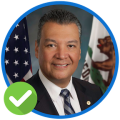Reelect Diana Becton to keep Contra Costa on the right track for progress.
The Position
Each of the 58 counties in California elects a district attorney to manage the prosecution of criminal offenses related to the violation of state and county laws. The district attorney has investigative authority, manages the apprehension of individuals identified through the investigative process, and holds charging and prosecutorial power. The work of the district attorney includes municipal and superior court operations, and the D.A. serves as a legal liaison to the grand jury. The county Board of Supervisors provides financial oversight to the district attorney’s office, but holds no operational power over their work. District attorneys are elected to four-year terms in office.
The District
Contra Costa is California’s ninth most populous county, with a population of more than 1,100,000. Contra Costa’s District Attorney oversees an office of 21 deputy district attorneys, and the prosecution of criminal offenses across the county and unincorporated areas. Contra Costa has a demographic breakdown of 24% Latino, 14% Asian, and 9% Black.
The Race
District Attorney Diana Becton is running for reelection to this seat, to which she was appointed, and then elected, in 2017 and 2018, respectively. She is being challenged by Mary Knox, a deputy district attorney in Contra Costa County. Becton’s campaign has raised $275,000, and is not funded by corporate PAC, fossil fuel, law enforcement, or real estate money. Opponent Knox’s plans for the county are based on regressive policies that include increasing policing and expanding public and digital surveillance by law enforcement—policies that have been shown to harm and disproportionately target communities of color.
Our Endorsement
District Attorney Diana Becton is from California and leads a prosecutorial office of approximately 200 lawyers, investigators, and staff. In 2018, she was appointed as the first woman and African American district attorney of Contra Costa County in the history of the county to fill the vacancy left by the former district attorney, who resigned after being charged with perjury and grand theft. Community groups and leaders advocated for her original appointment. According to campaign materials, District Attorney Becton is running for reelection to keep communities safe, give crime victims a voice, and lead the office with integrity.
As district attorney, Becton has brought notable progressive change to the office, including abolishing juvenile-justice fees and pledging to publicly release reports on officer-involved fatalities. She is the co-author of two justice-reform bills that have changed how serious crimes can be prosecuted, including one that prohibits children under 16 from being charged as adults. She has provided leadership in moving the county forward in diversion programs, bail reform, and restorative justice. Her accomplishments include allocating $1 million to establish the first trauma-informed, victim-centered diversion program and bringing sexual-assault testing cases up to date. Her top three priorities moving forward are establishing ways to make law-enforcement data available to craft better policies, focusing on securing funding for restorative justice and diversion programs for 20- to 24-year-olds, and continuing to work to improve transparency and accountability. She has also pledged to work with labor and community groups, Jewish partners, and the Latino and Asian communities, and to prosecute hate crimes. Her goals include ending racial and implicit bias in the criminal-justice system and working on policy changes.
District Attorney Becton previously served as a Santa Clara County judge for 22 years, where she was elected as presiding judge. She is a longtime supporter of bail reform, alternatives to incarceration for low-level, nonviolent offenders, and mental-health treatment for those who need it. She received the Woman of the Year award from State Senator Nancy Skinner for disrupting the school-to-prison pipeline, reducing recidivism and incarceration rates, and creating safe alternatives for low-level nonviolent offenders. Becton is a past president of the National Association of Women Judges, the country’s leading platform for women in the judiciary system. She also served as chair of the State Bar Council on Access and Fairness.
District Attorney Becton is endorsed by many progressive leaders and groups in the district, including Representative Mark DeSaulnier, Antioch Mayor Pro Tem Monica Wilson, Richmond Mayor Tom Butt, BART Director Lateefah Simon, Black Women Organized Political Action, Contra Costa Central Labor Council, Contra Costa Young Democrats, and West Contra Costa Democratic Club. She is also endorsed by several police officers. Based on our analysis, District Attorney Becton’s track record and policy positions demonstrate that she will continue to be a progressive champion for the constituents of Contra Costa and will govern effectively in the best interest of this diverse district.
Reelect Diana Becton to keep Contra Costa on the right track for progress.
The Position
Each of the 58 counties in California elects a district attorney to manage the prosecution of criminal offenses related to the violation of state and county laws. The district attorney has investigative authority, manages the apprehension of individuals identified through the investigative process, and holds charging and prosecutorial power. The work of the district attorney includes municipal and superior court operations, and the D.A. serves as a legal liaison to the grand jury. The county Board of Supervisors provides financial oversight to the district attorney’s office, but holds no operational power over their work. District attorneys are elected to four-year terms in office.
The District
Contra Costa is California’s ninth most populous county, with a population of more than 1,100,000. Contra Costa’s District Attorney oversees an office of 21 deputy district attorneys, and the prosecution of criminal offenses across the county and unincorporated areas. Contra Costa has a demographic breakdown of 24% Latino, 14% Asian, and 9% Black.
The Race
District Attorney Diana Becton is running for reelection to this seat, to which she was appointed, and then elected, in 2017 and 2018, respectively. She is being challenged by Mary Knox, a deputy district attorney in Contra Costa County. Becton’s campaign has raised $275,000, and is not funded by corporate PAC, fossil fuel, law enforcement, or real estate money. Opponent Knox’s plans for the county are based on regressive policies that include increasing policing and expanding public and digital surveillance by law enforcement—policies that have been shown to harm and disproportionately target communities of color.
Our Endorsement
District Attorney Diana Becton is from California and leads a prosecutorial office of approximately 200 lawyers, investigators, and staff. In 2018, she was appointed as the first woman and African American district attorney of Contra Costa County in the history of the county to fill the vacancy left by the former district attorney, who resigned after being charged with perjury and grand theft. Community groups and leaders advocated for her original appointment. According to campaign materials, District Attorney Becton is running for reelection to keep communities safe, give crime victims a voice, and lead the office with integrity.
As district attorney, Becton has brought notable progressive change to the office, including abolishing juvenile-justice fees and pledging to publicly release reports on officer-involved fatalities. She is the co-author of two justice-reform bills that have changed how serious crimes can be prosecuted, including one that prohibits children under 16 from being charged as adults. She has provided leadership in moving the county forward in diversion programs, bail reform, and restorative justice. Her accomplishments include allocating $1 million to establish the first trauma-informed, victim-centered diversion program and bringing sexual-assault testing cases up to date. Her top three priorities moving forward are establishing ways to make law-enforcement data available to craft better policies, focusing on securing funding for restorative justice and diversion programs for 20- to 24-year-olds, and continuing to work to improve transparency and accountability. She has also pledged to work with labor and community groups, Jewish partners, and the Latino and Asian communities, and to prosecute hate crimes. Her goals include ending racial and implicit bias in the criminal-justice system and working on policy changes.
District Attorney Becton previously served as a Santa Clara County judge for 22 years, where she was elected as presiding judge. She is a longtime supporter of bail reform, alternatives to incarceration for low-level, nonviolent offenders, and mental-health treatment for those who need it. She received the Woman of the Year award from State Senator Nancy Skinner for disrupting the school-to-prison pipeline, reducing recidivism and incarceration rates, and creating safe alternatives for low-level nonviolent offenders. Becton is a past president of the National Association of Women Judges, the country’s leading platform for women in the judiciary system. She also served as chair of the State Bar Council on Access and Fairness.
District Attorney Becton is endorsed by many progressive leaders and groups in the district, including Representative Mark DeSaulnier, Antioch Mayor Pro Tem Monica Wilson, Richmond Mayor Tom Butt, BART Director Lateefah Simon, Black Women Organized Political Action, Contra Costa Central Labor Council, Contra Costa Young Democrats, and West Contra Costa Democratic Club. She is also endorsed by several police officers. Based on our analysis, District Attorney Becton’s track record and policy positions demonstrate that she will continue to be a progressive champion for the constituents of Contra Costa and will govern effectively in the best interest of this diverse district.










